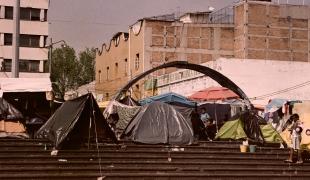The Philippines: one year after typhoon Haiyan
Communiqué de presse
A report on Médecins Sans Frontières’humanitarian response
Typhoon Haiyan, or Yolanda as it is known locally, was the strongest typhoon ever recorded at landfall, ripped through the central Philippines on 8 November 2013. It caused devastation on an unprecedented scale – roofs were ripped off, villages were flattened, livelihoods were swept away and a tsunami-like storm surge claimed more than 6,300 lives and displaced some 4 million people.
In the aftermath of the typhoon, MSF was able to provide emergency assistance to communities on three of the worst-affected islands: Guiuan and nearby towns on Eastern Samar; Tacloban, Tanauan, Palo, Ormoc, Santa Fe and Burauen on Leyte; and Estancia, Carles and San Dionisio on mainland Panay, as well as several outlying islands. This included addressing acute and immediate medical trauma needs; restoring basic medical services and facilities; providing shelter, reconstruction kits, water and sanitation facilities; and offering psychosocial support to both children and adults.
One month after the typhoon, the government created a special office to oversee the post-Haiyan recovery and rehabilitation efforts. After three months, immediate medical and humanitarian needs had greatly reduced in some areas, and support for overwhelmed public healthcare facilities and the distribution of relief items were no longer required. Houses had been rebuilt, and most of the displaced had returned home, moved to relocation sites or were in temporary housing, although some remained at evacuation sites.
In July 2014, the emergency was declared over but a year on, recovery and rehabilitation work continue. Médecins Sans Frontières (MSF) has adapted its response to fill medical gaps and meet the needs of the Filipino people. This has ranged from providing immediate life-saving care and relief assistance to restoring public health capacity to pre-typhoon levels.
MSF has gradually reduced its activities, handed over medical programmes to local health authorities and closed projects where its services and expertise are no longer needed.
Last July, upon completion of the new transitional Felipe Abrigo Memorial hospital in Guiuan, fully furnished and complete with equipment, it was handed over to and managed by provincial health office since. A handful of MSF staff stayed on for three months providing technical support in running the hospital. By October 2014, MSF officially withdrew from Guiuan.
Today, in collaboration with the provincial health offices, MSF is providing maternal and neonatal care in Leyte Provincial Hospital (Palo, Leyte Island) and is involved in rendering another three hospitals fully functional again - Albino Memorial Hospital and General MacArthur Hospital, both in Eastern Samar; and Abuyog Municipal Hospital in Leyte.
► Retrouvez notre dossier spécial consacré à nos activités aux Philippines.


